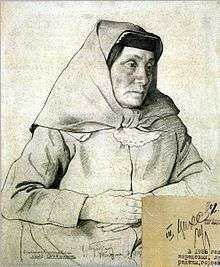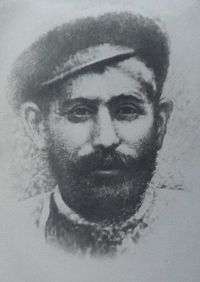Keke Geladze
| Keke Geladze კეკე გელაძე | |
|---|---|
 Ekaterine Geladze (credited as Dzhugashvili) | |
| Born |
Ekaterine Giorgis asuli Geladze 5 February 1858 Gambareuli, Gori, Russian Empire |
| Died |
4 June 1937 (aged 79) Tiflis, Georgian SSR, Soviet Union |
| Spouse(s) | Besarion Jughashvili |
| Children |
Mikheil Giorgi Ioseb |
| Parent(s) |
Giorgi Geladze Melania Homezurashvili |
Ekaterine Giorgis asuli Jughashvili[lower-alpha 1][1] (née Geladze)[2] (5 February 1858 – 4 June 1937) was the mother of Joseph Stalin. Those close to her called her Keke. Her husband was Besarion Jughashvili.
Early life
Keke was born to a family of Georgian Orthodox Christian serfs in Gambareuli near Gori in 1858. Her father, Giorgi (aka Glakha)[3] Geladze, was a potter belonging to Prince Amilakhvari. He died young and the family was always poor, but somehow her mother Melania[4] ensured that Keke learned to read and write. She had two brothers: Gio and Sandala.
Marriage and motherhood

At 17, Keke met and married Besarion Jughashvili. Her first two children died shortly after birth—Mikhail in 1876 and Georgy the following year from measles. Her third son (and last child), Joseph, was born on December 18, 1878 and survived. Nicknamed "Soso", Joseph grew up in a violent home: his father ("Beso") was incessantly drunk and beat his mother and him frequently. Once Joseph was beaten so hard there was blood in his urine for just over a week.[5] When Stalin's father beat Keke, Keke occasionally fought back. Once, a blood soaked Joseph ran to the Gori police chief Davrichewy crying: "Help! Come quickly! He's killing my mother!" Joseph even threw a knife at his father while defending his mother. Before Joseph was 10, Beso left the family home (some sources say he was thrown out by his wife).
To support herself and her son, Keke took on any menial job available; mainly housework, sewing and laundering.[6] They had nine homes in the next decade. She returned once when Beso promised to improve, but she soon left to live with Father Charkviani. Keke often worked in the houses of rich Jewish traders in Gori, and sometimes took her son along. She did housework for Davrichewy, laundered for Egnatashvili (the best man at her wedding), with whom she may have had an affair. Beso would smash his tavern windows when he heard. She eventually settled in a couture shop where she worked for 17 years.[7] Joseph was said to have been a smart child and he entertained some of the householders, including David Pismamedov who encouraged the young Stalin to study, and gave him money and books to read. Charkviani's sons taught Joseph Russian.
His mother's ambition was for Joseph to become a bishop and she somehow accumulated enough money for his education, perhaps with Pismamedov's help. In 1888, she was able to enroll Soso into the Gori Church School and, later, with his mother's encouragement, he obtained a scholarship to the Tiflis Theological Seminary, a Georgian Orthodox institution which he attended from the age of sixteen. She had made sure he was the best dressed of the boys on his first school day despite being the poorest. In 1890, Joseph's father kidnapped him after a serious street accident and made him work in the Adelkhanov shoe factory. His horrified mother fought desperately to send him back to school, appealing to all her friends and even the Exarch of the Georgian Church. Keke now laundered for the chairman of the school board at a salary of 10 roubles a month. Keke was so angry with Joseph when he was expelled from the seminary that he hid outside Gori for a while; friends brought him food.[8]
Later life
Later in life, when Stalin achieved prominence in the communist regime in the 1920s, his mother was installed in a palace in the Caucasus, formerly used by the tsar's viceroy. There she is said to have occupied only one tiny room from where she wrote frequent letters (in Georgian – she never managed to learn good Russian) to her son and daughter-in-law.
Stalin visited his mother very rarely after the Revolution. Lavrentiy Beria took responsibility for her care.[9] Stalin wrote letters to Keke occasionally. These letters were affectionate and upbeat, but short; it took him an excessively long time to write them because it had become difficult for him to write in Georgian (the only language his mother understood).[10] N. Kipshidze, a doctor who treated Keke in her old age, recalled that when Stalin visited his mother in October 1935, he asked her: "Why did you beat me so hard?" "That's why you turned out so well", Keke answered. In return, his mother asked him: "Joseph – who exactly are you now?" "Do you remember the tsar? Well, I'm like a tsar", replied Stalin. "You'd have done better to have become a priest" was his mother's retort.[11]
Keke died of pneumonia on June 4, 1937. Although her death was reported in Georgia, Stalin ordered that the news not be reported across the rest of the Soviet Union. Stalin did not attend the funeral, held on June 8; the Great Purge had reached a frenzied intensity, and Stalin was apparently preoccupied by the purge of the Red Army leadership at the time. He sent a wreath, on which he referred to himself by his original name, Joseph Dzhugashvili. Despite Keke's devout religious beliefs, she was given a secular funeral fit for a leading Bolshevik, with Beria as one of her pallbearers.[10]
In later years, Stalin's daughter, Svetlana Alliluyeva, remarked that Stalin was never afraid of anyone, except his mother. Keke was a distant figure to the young Svetlana, as she chose to remain in Georgia; she died while Svetlana was still a child, and Svetlana apparently visited her on only one occasion.[12]
References
- ↑ Georgian: ეკატერინე გიორგის ასული ჯუღაშვილი
Russian equivalent: Ekaterina Georgievna Dzhugashvili
Some sources give her name as "Katerine", "Yekaterina", or "Ketevan". However, the church records of Gori and Keke's obituary both list her name as "Ekaterine".
"Giorgis asuli" means "daughter of Giorgi" in Georgian. The birth register entry for her son, Ioseb, notes her name as "Ekaterina, daughter of Gabriel". This is probably a clerical error, as in her memoirs, Keke gave her father's name as "Glakha, or Giorgi".
- ↑ Obituary of Ekaterine Jughashvili, from the newspaper of Tbilisi University, 1937 (archived in the library of Tibilisi State University)
4 ივნისს ქ.თბილისში მძიმე ავადმყფობის შემდეგ გარდაიცვალა ეკატერინე გიორგის– ასული ჯუღაშვილი.–საერთაშორისო პროლეტარიატის დიდი ბელადის, ამხანაგ სტალინის დედა(გელაძის ქალი).იგი დაიბადა 1856 წ.სოფელ ღამბარეულში, განიცდიდა უკიდურეს გაჭირვებას. 1874 წელს მისთხოვდა ბესარიონ ჯუღაშვილს. 1879 წელს 21 დეკემბერს დაიბადა იოსებ ბესარიონის–ძე სტალინი.
trans.: After a severe illness in Tbilisi, on June 4, Ekaterine Giorgis-asuli Jughashvili has died. She was the mother of Comrade Stalin, born in 1856 in the village of Ghambareulshi, and suffered extreme hardship. In 1874 she married Besarion Jughashvili. On 21 December 1879, Ioseb Besarionis-dze Stalin was born. - ↑ Georgian: გელაძე
- ↑ Keke Jughashvili (2012). My Dear Son: The Memoirs of Stalin's Mother. Ministry of Internal Affairs of Georgia.
- ↑ Montefiore 2007, p. 22
- ↑ Montefiore 2007, p. 23
- ↑ Washington Post.com
- ↑ Montefiore 2007, p. 26
- ↑ Montefiore 2007, p. 63
- ↑ Montefiore. Stalin: The Court of the Red Tsar. 2003
- 1 2 Zhores and Roy Medvedev, The Unknown Stalin (2003), pages 300–305.
- ↑ Radzinsky 1997, p. 32
- ↑ Rosemary Sullivan, Stalin's Daughter: The Extraordinary and Tumultuous Life of Svetlana Alliluyeva (2015).
Bibliography
- Montefiore, Simon Sebag (2007), Young Stalin, Weidenfeld & Nicolson, ISBN 978-0-297-85068-7
- Radzinsky, Edvard (1997), Stalin: The First In-depth Biography Based on Explosive New Documents from Russia's Secret Archives, Anchor, ISBN 978-0-385-47954-7